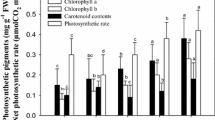Abstract
Synthetic seeds are defined as any tissue with the potential to grow into a plant under in vitro or in vivo conditions that has been artificially encapsulated somatic embryos, shoot buds, cell aggregates, or other tissues. These tissues retain their potentiality even after being stored. Somatic embryos used in plant production and dispersed in the field were considered synthetic seeds. After using artificial seeds, shoot apical tips, axillary buds, and nodal segments have also been used as suitable substitutes for somatic embryos. The current study’s goal was to standardize artificial seed production methods using Populus alba encapsulated nodal explants and in vitro regeneration. This woody species is male tree and has no seed formation. Several concentrations of sodium alginate (2, 3, 4 and 5%) were mixed separately with the somatic endosperm of P. alba; and finally encapsulated with various concentrations of CaCl2 (50, 75, 100 and 200mM). The morphological and physiological parameters were measured and sometimes showed significant differences. The best conditions for these synthetic seeds’ formation based on the morphological and physiological parameters were the beads with 3 and 4% sodium alginate which are encapsulated by 100 and 200mM of CaCl2. The current study clearly established and demonstrated the best method for producing artificial seed in P. alba.
Key message
Synthetic seeds are modern application for tissue culture to solve germination problem, either in non-germinated plants or poor-germinated ones. These seeds germinated with higher productivity comparing to plantlets from micropropagation.







Similar content being viewed by others
Data Availability
All data of this work are available here.
References
Ahmed MF, Hosni AM, Hewidy M, Abd El razik AB, Bahnasy MI (2019) Morphological, chemical characters and genetic analysis discrimination of five naturalized populus species inhabiting four governorate territories of Egypt. Arab Univ J Agric Sci 27(4):2273–2290. https://doi.org/10.21608/AJS.2019.17898.1099
Ahmed MF, Ahmed EZ, Aloufi S, Alqurashi M, Alyamani A, Fayad E, Hussien ET (2022) Vital parameters assessments of starvation tolerance of in vitro Populus alba culture. Phyton 91(4):889–902. https://doi.org/10.32604/phyton.2022.018600
Asmah HN, Hasnida HN, Zaimah NAN, Noraliza A, Salmi NN (2011) Synthetic seed technology for encapsulation and regrowth of in vitro-derived Acacia hyrid shoot and axillary buds. Afr J Biotechnol 10:7820–7824. https://doi.org/10.5897/AJB11.492
Chang CC, Yang MU, Wen HM, Chern JC (2002) Estimation of total flavonoid content in propolis by two complementary colorimetric methods. J Food Drug Anal 10:178–182
Danso KE, Ford-Lloyd BV (2003) Encapsulation of nodal cuttings and shoot tips for storage and exchange of cassava germplasm. Plant Cell Rep 21:718–725. https://doi.org/10.1007/s00299-003-0594-9
Edwards K, Johnstone C, Thompson C (1991) A simple and rapid method for the preparation of plant genomic DNA for PCR analysis. Nucleic Acid Res 19:1349. https://doi.org/10.1093/nar/19.6.1349
Endress R (1994) Plant cell biotechnology. Springer-verlag, Berlin, pp 256–269
Gingeas VM, Lineberger RD (1989) Asexual embryogenesis and plant regeneration in Quercus. Plant Cell Tiss Org Cult 17:191–203. https://doi.org/10.1007/BF00046867
Gray DJ, Purohit A, Triglano RN (1991) Somatic embryogenesis and development of synthetic seed technology. Crit Rev Plant Sci 10:33–61. https://doi.org/10.1080/07352689109382306
Grzegorczyk I, Wysokińska H (2011) A protocol for synthetic seeds from Salvia officinalis L. shoot tips. Acta Biol Cracov Bot 53/1:80–85. https://doi.org/10.2478/v10182-011-0011-6
Guan Y, Li S-G, Fan X-F, Su Z-H (2016) Application of somatic embryogenesis in woody plants. Front. Plant Sci 7:938. https://doi.org/10.3389/fpls.2016.00938
Hussien ET, Shaban SA, Ali OM, Seel HKM, El-sayed NEAE, Samir YEA, Remaly GM, Mohammed AS (2021) Chemical profile and antibacterial activity of Mentha viridis L. essential oils and ethanolic extract. J Agric Crop Res 9(2):34–39. https://doi.org/10.33495/jacr_v9i2.21.110
Hussien ET, Ahmed MF, Ahmed EZ (2022) Biometric measurements and genetic instability assessment of in vitro micro-shoots culture of Populus alba. Plant Physiol Rep 27:398–406. https://doi.org/10.1007/s40502-022-00682-9
Islam MS, Bari MA (2012) In vitro regeneration protocol for artificial seed production in an important medicinal plant Mentha arvensis L. J. bio-sci. 20:99–108. https://doi.org/10.3329/jbs.v20i0.17722
Jaiswal U, Ara H, Jaiswal VS (2000) Synthetic seed: prospects and limitations. Curr Sci 78(12):1438–1444. https://www.jstor.org/stable/24104316
Lelu-Walter M-A, Thompson D, Harvengt L, Sanchez L, Toribio M, Pâques LE (2013) Somatic embryogenesis in forestry with a focus on Europe: state-of-the-art, benefits, challenges and future direction. Tree Genet Genomes 9:883–899. https://doi.org/10.1007/s11295-013-0620-1
Merkle SA, Dean JF (2000) Forest tree biotechnology. Curr Opin Biotechnol 11:298–302. https://doi.org/10.1016/s0958-1669(00)00099-9
Metzener H, Rau H, Senger H (1965) Studies on synchronization of some pigment-deficient Chlorella mutants. Planta 65:186–194. https://doi.org/10.1007/BF00384998
Murashige T (1977) Plant cell and organ cultures as horticultural practices. In Proceedings of the Symposium on Tissue Culture for Horticultural Purposes, Ghent, Belgium. https://doi.org/10.17660/ActaHortic.1977.78.1
Reddy MC, Murthy KSR, Pullaiah T (2012) Synthetic seeds: a review in agriculture and forestry. Afr J Biotech 11(78):14254–14275. https://doi.org/10.5897/AJB12.770
Redenbaugh K, Slade D, Viss PR, Fujii J (1987) Encapsulation of somatic embryos in synthetic seed coats. Hort Sci 22:803–809
Rihan HZ, Kareem F, El-Mahrouk ME, Fuller MP (2017) Artificial seeds (Principle, aspects and applications). Agronomy 7:71. https://doi.org/10.3390/agronomy7040071
Saiprasad G (2001) Artificial seeds and their applications. Resonance 6:39–47. https://doi.org/10.1007/BF02839082
Shuaib M, Zeb A, Ali Z, Ali W, Ahmad T, Khan I (2007) Characterization of wheat varieties by seed storage protein electrophoresis. Afr J Biotech 6:497–500. http://www.academicjournals.org/AJB
Wang M, Simon JE, Aviles IF, He K, Zheng QY, Tadmore Y (2003) Analysis of phenolic compounds in artichoke (Cynara scolymus L). J Agric Food Chem 51:601–608. https://doi.org/10.1021/jf020792b
Acknowledgements
This study was supported by Researchers Supporting Project (RSP2024R25), King Saud University, Riyadh, Saudia Arabia.
Author information
Authors and Affiliations
Corresponding authors
Ethics declarations
Conflict of interest
The authors declare no conflict of interest.
Additional information
Communicated by Sergey V Dolgov.
Publisher’s Note
Springer Nature remains neutral with regard to jurisdictional claims in published maps and institutional affiliations.
Rights and permissions
Springer Nature or its licensor (e.g. a society or other partner) holds exclusive rights to this article under a publishing agreement with the author(s) or other rightsholder(s); author self-archiving of the accepted manuscript version of this article is solely governed by the terms of such publishing agreement and applicable law.
About this article
Cite this article
Hussien, E.T., Ahmed, M.F., Abdel-Gaber, R. et al. Synthesis and characterization of artificial seeds plantlets of in vitro male Populus alba. Plant Cell Tiss Organ Cult 156, 37 (2024). https://doi.org/10.1007/s11240-023-02664-7
Received:
Accepted:
Published:
DOI: https://doi.org/10.1007/s11240-023-02664-7



